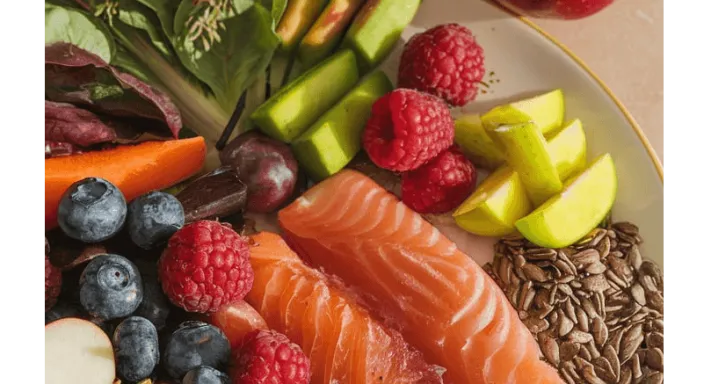Diet Tips for Eczema Patients: Foods to Eat and Avoid for Healthier Skin
By:
Kevin Chong
On
10/11/2024Reading time:
5 min
Summary:
Eczema, a chronic inflammatory skin condition, can cause itching, dryness, and redness that can be challenging to manage. While skincare routines are essential, diet also plays a significant role in managing eczema. For many eczema patients, certain foods can either soothe or trigger flare-ups, making dietary choices a crucial part of managing the condition.
In this post, we’ll explore foods that can help soothe eczema-prone skin, ingredients that may worsen symptoms, and practical diet tips for achieving healthier skin.

How Diet Affects Eczema
Eczema is closely linked to the body’s inflammatory response, and certain foods can trigger or calm this response. Foods that promote inflammation may worsen symptoms, while those with anti-inflammatory properties may help reduce flare-ups and keep skin healthy. For some people, specific foods can also cause allergic reactions that lead to eczema flare-ups, so identifying these triggers is key.
Foods That May Help Soothe Eczema
Omega-3 Rich Foods
Sources: Salmon, mackerel, flaxseeds, chia seeds, and walnuts.
Benefits: Omega-3 fatty acids have powerful anti-inflammatory properties that may help reduce skin inflammation, improve moisture retention, and support overall skin health. Regularly incorporating omega-3-rich foods into your diet can be beneficial for managing eczema symptoms.
Probiotics
Sources: Yogurt with live cultures, kefir, sauerkraut, kimchi, and miso.
Benefits: Probiotics are beneficial bacteria that support gut health. Studies suggest that a healthy gut microbiome may help improve skin health and reduce eczema flare-ups. Adding probiotic-rich foods to your diet can promote a balanced immune response, potentially easing eczema symptoms.
Antioxidant-Rich Foods
Sources: Berries (blueberries, strawberries), leafy greens (spinach, kale), bell peppers, and tomatoes.
Benefits: Antioxidants help fight oxidative stress, which can trigger inflammation in the body. By eating a diet rich in antioxidants, you may reduce eczema symptoms and support skin repair and rejuvenation.
Quercetin-Rich Foods
Sources: Apples, grapes, broccoli, onions, and green tea.
Benefits: Quercetin is a natural anti-inflammatory compound that may help reduce allergy symptoms and inflammation. Including quercetin-rich foods can be particularly helpful for eczema patients with food allergies that trigger skin reactions.
Vitamin E-Rich Foods
Sources: Almonds, sunflower seeds, hazelnuts, and avocados.
Benefits: Vitamin E is essential for skin health and helps protect skin cells from damage. Adding foods high in vitamin E to your diet can improve skin hydration, reduce dryness, and promote healing in eczema-prone areas.
Foods to Avoid for Eczema-Prone Skin
Dairy Products
Sources: Milk, cheese, yogurt, and ice cream.
Concern: For some people, dairy products can trigger inflammation or allergic reactions that worsen eczema symptoms. If dairy seems to aggravate your skin, consider switching to non-dairy alternatives like almond or oat milk.
Gluten-Containing Foods
Sources: Wheat, barley, rye, and foods like bread, pasta, and cereals.
Concern: Gluten sensitivity can contribute to eczema flare-ups in some individuals. If you suspect gluten is a trigger, consider trying gluten-free grains like quinoa, rice, and oats to see if your symptoms improve.
Sugary Foods and Refined Carbs
Sources: Sweets, pastries, white bread, soda, and processed snacks.
Concern: Sugar can increase inflammation and suppress the immune system, potentially worsening eczema symptoms. Reducing refined sugars and opting for natural sugars like those found in fruits may benefit your skin.
Nightshade Vegetables
Sources: Tomatoes, potatoes, peppers, and eggplants.
Concern: Nightshade vegetables can trigger inflammation in some people, especially those with eczema. If you find these vegetables exacerbate your symptoms, consider reducing or avoiding them in your diet.
Processed Foods and Additives
Sources: Packaged snacks, fast food, preservatives, artificial colors, and flavors.
Concern: Processed foods often contain additives and preservatives that can trigger eczema flare-ups. Stick to whole, natural foods to reduce the risk of reaction and provide your skin with essential nutrients.
Additional Tips for Eczema-Friendly Eating
Stay Hydrated: Drinking plenty of water helps keep your skin hydrated from the inside out. Hydration is essential for managing eczema dryness and preventing flare-ups.
Identify Personal Triggers: Keep a food diary to track any food-related flare-ups. This can help you pinpoint specific foods that may be aggravating your eczema.
Consider an Elimination Diet: If you suspect certain foods are worsening your eczema, an elimination diet under the guidance of a healthcare provider can help identify which foods to avoid.
Eat a Balanced Diet: A varied diet rich in whole foods will provide the vitamins, minerals, and healthy fats necessary to support overall skin health.
While diet alone won’t cure eczema, making mindful choices about what you eat can help manage symptoms and reduce the frequency of flare-ups. Focus on anti-inflammatory and nutrient-rich foods, while minimizing common irritants, to support healthier, more resilient skin. With a balanced approach and attention to your body’s signals, diet can be an effective tool for those managing eczema.
